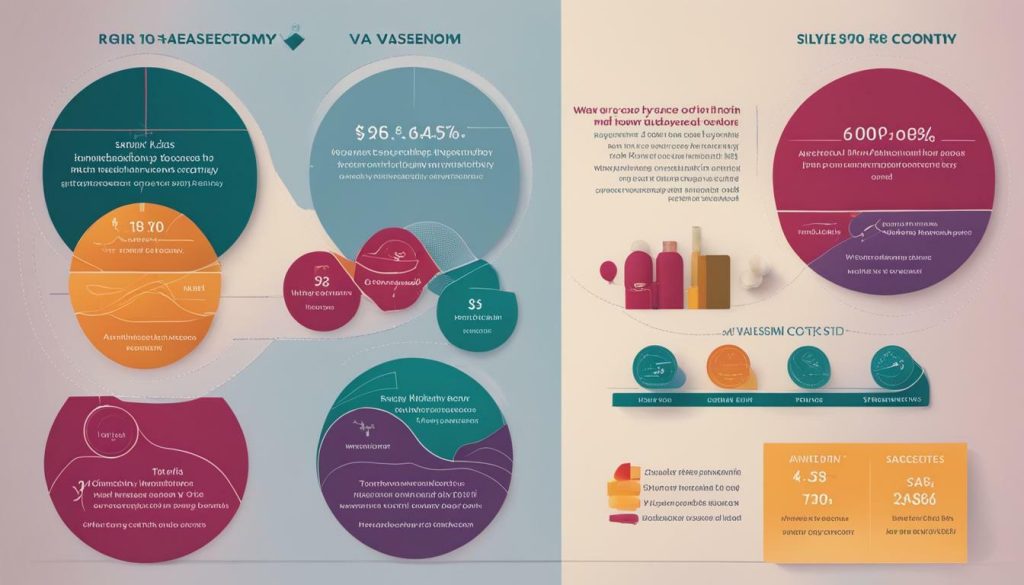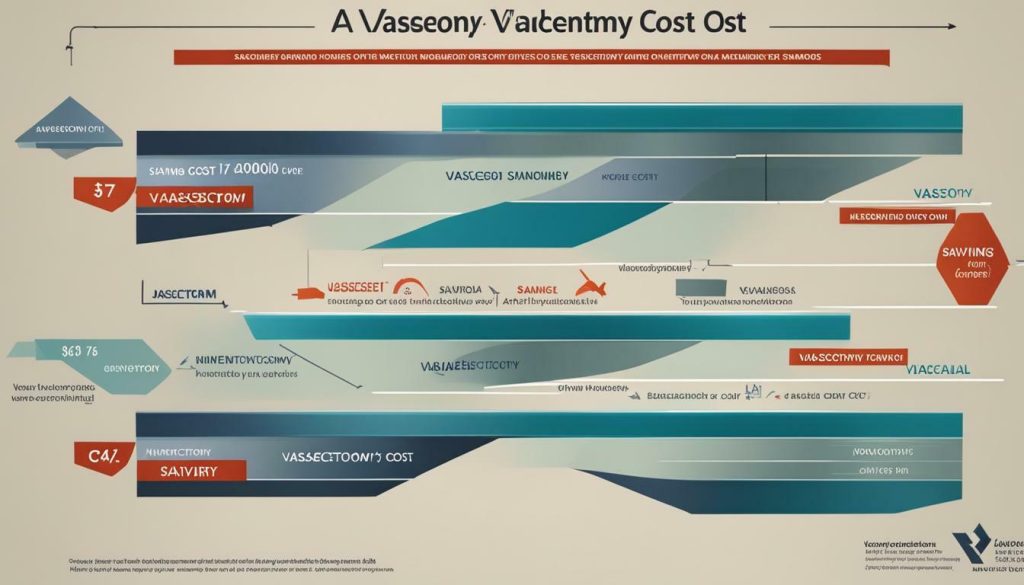If you’re considering a vasectomy but are uncertain about the cost, you’ve come to the right place. In this article, I will break down the expenses associated with vasectomy procedures and provide key insights to help you make an informed decision. Let’s dive in!
- The average cost of a vasectomy is around $1,000, but this can vary based on factors such as insurance coverage and location.
- Most private insurers cover vasectomies, but there may still be out-of-pocket costs to consider.
- Medicare does not cover vasectomies, as they are considered elective procedures.
- If a vasectomy reversal is desired, it can cost between $5,000 and $15,000 and is typically not covered by insurance.
- Vasectomies are a cost-effective long-term birth control solution compared to other methods.
Understanding the Average Cost of a Vasectomy
The average cost of a vasectomy typically falls around $1,000, but it’s important to note that this can vary depending on several factors. Factors such as insurance coverage and the location where the procedure is performed play a significant role in determining the final cost.
Insurance coverage for vasectomies is commonly provided by private insurers, but there may still be out-of-pocket costs involved. It’s essential to check with your insurance provider to understand the specific coverage and any potential expenses you may need to bear.
Unfortunately, Medicare does not cover the cost of vasectomies as they are considered elective procedures. This means that individuals relying on Medicare would need to pay for the procedure out of pocket.
| Insurance Coverage | Medicare |
|---|---|
| Private insurers usually cover vasectomies, but there may be out-of-pocket costs. | Medicare does not cover vasectomies; individuals must pay out of pocket. |
If a vasectomy reversal is desired, it’s important to note that this procedure can cost between $5,000 and $15,000. However, it is typically not covered by insurance.
“The cost of vasectomy reversal can range from $5,000 to $15,000, and unfortunately, it is typically not covered by insurance.”
When comparing the cost of a vasectomy to other forms of birth control, it’s worth considering the long-term cost-effectiveness. While the upfront cost might be higher, vasectomies are more budget-friendly in the long run, as they eliminate the need for ongoing birth control expenses.

Understanding the cost of a vasectomy is crucial for individuals considering the procedure. By considering factors such as insurance coverage, the potential for out-of-pocket expenses, and the long-term cost-effectiveness, individuals can make an informed decision about their reproductive health.
Factors Influencing Vasectomy Costs
There are several factors that can impact the overall cost of a vasectomy procedure. The cost of a vasectomy can vary depending on insurance coverage, the type of procedure performed, and the location where the procedure is carried out. Let’s take a closer look at these factors and how they can affect the cost.
- Insurance Coverage: Most private insurers cover vasectomies, but it’s important to check the specifics of your plan to understand what expenses might still be incurred. While insurance coverage can help reduce the cost, there may still be out-of-pocket expenses to consider.
- Type of Procedure: The cost of a vasectomy can also be influenced by the type of procedure performed. Traditional vasectomy techniques are generally less expensive than more advanced procedures like the no-scalpel vasectomy. The complexity of the procedure and the experience of the healthcare provider can also impact the price.
- Location: The cost of a vasectomy can vary based on geographical location. Factors such as local healthcare costs, availability of providers, and competition can all play a role in determining the price. It’s important to research and compare costs in your area to ensure you are getting the best value.
It’s worth noting that Medicare does not cover vasectomies, as they are considered elective procedures. This means individuals relying solely on Medicare for their healthcare coverage will need to pay for the procedure out-of-pocket. Additionally, while a vasectomy is typically considered a permanent form of birth control, some individuals may choose to undergo a vasectomy reversal in the future. However, it’s important to be aware that the cost of a vasectomy reversal can range from $5,000 to $15,000 and is often not covered by insurance.
When considering the cost of a vasectomy, it’s also important to consider the long-term cost-effectiveness. While the upfront cost may seem significant, vasectomies are more cost-effective in the long run compared to other forms of birth control. Since a vasectomy is a one-time procedure, there are no ongoing costs for contraception. This can result in significant savings over time, making vasectomies a financially sensible choice for many individuals and couples.
Table: Average Cost of Vasectomy Procedures
| Procedure | Estimated Cost |
|---|---|
| Traditional Vasectomy | $800 – $1,200 |
| No-Scalpel Vasectomy | $1,500 – $3,000 |
| Vasectomy Reversal | $5,000 – $15,000 |
As you can see, the cost of a vasectomy can vary depending on several factors. It’s important to consult with your healthcare provider and insurance company to understand the specific costs associated with your vasectomy procedure. While cost is certainly a consideration, it’s crucial to prioritize the expertise and quality of care provided by the healthcare professionals involved in the process.

If you have private insurance, it’s likely that your vasectomy will be partially or fully covered. Most private insurers recognize vasectomies as a cost-effective method of birth control and provide coverage for the procedure. However, it’s important to check with your insurance provider to understand the extent of coverage and any potential out-of-pocket costs.
Medicare, on the other hand, does not cover the cost of vasectomies. As an elective procedure, it falls outside the scope of coverage provided by this insurance program. Individuals relying solely on Medicare would need to cover the expenses associated with the procedure out of their own pocket.
It’s worth noting that even with private insurance coverage, there can be variations in the cost of vasectomies. Factors such as deductibles, copayments, and the specifics of your insurance plan can influence the overall cost. It’s recommended to contact your insurance provider directly to get a clear understanding of the coverage and potential expenses.
| Insurance Type | Coverage for Vasectomies |
|---|---|
| Private Insurance | Generally covered, but out-of-pocket costs may apply |
| Medicare | Does not cover vasectomies |
In conclusion, while private insurance plans typically cover the cost of vasectomies, it’s important to verify the details of your coverage to understand any potential expenses. Medicare does not provide coverage for this elective procedure. Consider reaching out to your insurance provider for more information and to determine the exact cost you may incur for your vasectomy.

Unfortunately, Medicare does not cover the cost of vasectomies, as they are considered elective procedures. This means that individuals relying on Medicare for their healthcare coverage will need to pay for the procedure out of pocket. This can be a significant expense, with the average cost of a vasectomy ranging from $1,000 to $3,000.
While Medicare provides coverage for a wide range of medical services, including many forms of birth control, vasectomies are not included in this coverage. This may come as a surprise to some individuals who assumed that Medicare would cover the cost of a vasectomy since it is a popular and effective method of birth control. Unfortunately, this is not the case.
It is important for individuals considering a vasectomy and relying on Medicare for their healthcare coverage to be aware of this limitation. Planning for the out-of-pocket cost of the procedure is essential to avoid any unexpected financial strain. Exploring alternative financing options or speaking with a healthcare provider about potential discounts or payment plans may help make the procedure more affordable.

The Cost of Vasectomy Reversal
While vasectomies are generally considered a permanent form of birth control, some individuals may wish to reverse the procedure in the future. However, it’s important to note that vasectomy reversal can come with a hefty price tag. The cost of vasectomy reversal typically ranges between $5,000 and $15,000, depending on various factors such as the surgeon’s fees, anesthesia costs, and facility fees.

Unlike the initial vasectomy procedure, which is typically covered by private insurance, vasectomy reversal is often not covered, leaving individuals to bear the full cost themselves. This can be a significant financial burden for those considering a reversal. It’s important to consult with healthcare providers and insurance companies to understand the potential out-of-pocket expenses and explore financing options if needed.
Considering the cost of vasectomy reversal, it’s crucial to weigh the decision carefully. It’s advisable to discuss the potential for reversibility with your healthcare provider before undergoing the initial vasectomy procedure. Understanding the long-term implications and potential expenses of reversing the procedure can help individuals make an informed decision about their reproductive future.
Insurance Coverage for Vasectomy Reversal
It’s important to note that the cost of vasectomy reversal is typically not covered by insurance. This means individuals who choose to have a vasectomy and later decide to reverse the procedure may face significant out-of-pocket expenses.
The cost of vasectomy reversal can range from $5,000 to $15,000, depending on several factors such as the surgeon’s experience, the complexity of the reversal, and the location of the procedure. Unfortunately, most insurance plans consider vasectomy reversal to be an elective procedure and therefore do not provide coverage for it.
For those considering vasectomy reversal, it is essential to carefully consider the financial implications. Without insurance coverage, the cost of the procedure can be substantial. It’s recommended to consult with a healthcare provider who specializes in vasectomy reversal to discuss the potential costs and any financing options that may be available.
| Cost of Vasectomy Reversal | Insurance Coverage |
|---|---|
| $5,000 – $15,000 | Typically not covered |
Overall, it’s important to weigh the costs and benefits of a vasectomy reversal before making a decision. While the upfront cost may be significant, it’s essential to consider the potential long-term expenses associated with other forms of birth control.
“Vasectomies are more cost-effective in the long run compared to other forms of birth control.”
By understanding the financial aspects and exploring all available options, individuals can make an informed decision that aligns with their personal circumstances and preferences.
The Cost-Effectiveness of Vasectomies
Despite the initial cost, vasectomies are often more cost-effective in the long run when compared to other birth control methods. A vasectomy typically costs around $1,000 on average, making it a relatively affordable option. When you consider the ongoing costs associated with other forms of birth control, such as monthly contraceptive pills or continuous use of condoms, the savings can quickly add up.
Let’s break down the numbers. Over the course of five years, the cost of monthly contraceptive pills can range from $600 to $1,200. Meanwhile, a vasectomy is a one-time expense that provides permanent contraception. By choosing a vasectomy, you could potentially save hundreds or even thousands of dollars over time.
| Birth Control Method | Cost over 5 years |
|---|---|
| Monthly contraceptive pills | $600 – $1,200 |
| Condoms | $500 – $1,000 |
| Vasectomy | $1,000 (one-time expense) |
It’s important to note that the cost of a vasectomy can vary depending on insurance coverage and where the procedure is performed. While most private insurers cover vasectomies, there may still be some out-of-pocket costs. It’s always a good idea to check with your insurance provider to understand your coverage and any potential expenses you may incur.

In summary, while the initial cost of a vasectomy may seem daunting, it offers significant long-term cost savings compared to other birth control methods. With the potential to save hundreds or even thousands of dollars over time, a vasectomy can provide not only peace of mind but also financial benefits. Talk to your healthcare provider to determine if a vasectomy is the right choice for you and your family.
Choosing a Vasectomy Provider
When considering a vasectomy, it’s essential to choose a provider that aligns with your budget and provides excellent care. The cost of a vasectomy can vary depending on factors such as insurance coverage and the location where the procedure is performed. On average, a vasectomy can cost around $1,000. However, it’s important to note that this is just an average, and prices can range from as low as a few hundred dollars to a couple thousand dollars.
One way to find a provider that fits your budget is to check with your insurance company. Most private insurers cover the cost of vasectomies, but it’s important to understand what your specific plan covers and if there are any out-of-pocket expenses. You can contact your insurance provider directly or speak with a representative to get more information about coverage and potential costs.
Another important consideration when choosing a vasectomy provider is the quality of care. It’s essential to select a provider who is experienced and reputable. You can research providers in your area, read reviews and testimonials from previous patients, and even seek recommendations from your primary care physician or friends who have undergone the procedure. Remember, the cost should not be the only factor in your decision-making process; the quality of care is equally important.
| Factors to Consider | Tips |
|---|---|
| Cost | Check with your insurance provider for coverage details and potential out-of-pocket costs. |
| Quality of Care | Research providers, read reviews, and seek recommendations from trusted sources. |
| Experience | Choose a provider who specializes in vasectomies and has a track record of successful procedures. |
| Location | Consider the convenience and accessibility of the provider’s office, especially for follow-up appointments. |
“Finding a vasectomy provider who meets your needs may require some research and exploration, but it’s a crucial step in the process. By considering factors such as cost, quality of care, and experience, you can make an informed decision and feel confident in your choice.”

Financing Options for Vasectomies
If the upfront cost of a vasectomy is a concern, there are financing options available to help make the procedure more affordable. Many medical providers offer payment plans that allow you to spread the cost of the vasectomy over several months or even years. This can be a great option for individuals who may not have the funds readily available to cover the full cost upfront.
Additionally, there are healthcare financing companies that specialize in providing loans for medical expenses. These companies often offer low-interest rates and flexible repayment terms, making it easier for you to manage the cost of your vasectomy. It’s important to carefully review the terms and conditions of any financing option to ensure that it aligns with your financial situation.

You may also consider checking if your employer offers a flexible spending account (FSA) or a health savings account (HSA). These accounts allow you to set aside pre-tax dollars specifically for medical expenses, including a vasectomy. By utilizing these accounts, you can save money on taxes while also budgeting for your procedure.
Before committing to a financing option, it’s important to discuss your financial concerns with your healthcare provider. They may be able to provide guidance or recommend specific financing resources that they have worked with in the past. Remember, the cost of a vasectomy is an investment in your reproductive health, and there are options available to help make it more affordable.
Vasectomy Cost Considerations
While the average cost of a vasectomy falls around $1,000, it’s important to consider other factors that may impact the final price. Factors such as insurance coverage, location, and any potential additional fees can all play a role in the overall cost of the procedure.
Insurance coverage is a major consideration when it comes to the cost of a vasectomy. Most private insurers cover the procedure, but it’s important to check with your specific insurance provider to understand what costs may be involved. Even with insurance coverage, there may still be out-of-pocket expenses, such as deductibles or copayments.
| Factor | Consideration |
|---|---|
| Insurance Coverage | Check with your insurance provider to understand what costs may be involved and if there are any out-of-pocket expenses. |
| Location | The cost of a vasectomy can vary depending on where the procedure is performed. Urban areas may have higher costs compared to rural areas. |
| Additional Fees | Be sure to ask about any potential additional fees, such as consultation fees, anesthesia fees, or follow-up appointments, to get a complete understanding of the total cost. |
It’s also important to note that Medicare does not cover vasectomies, as they are considered elective procedures. If you rely on Medicare for healthcare coverage, you will need to budget for the full cost of the vasectomy on your own.
While vasectomies are generally considered a permanent form of birth control, those who may desire a reversal should also factor in the cost of a vasectomy reversal. The cost of a reversal can range between $5,000 and $15,000, and it is typically not covered by insurance. It’s essential to weigh this potential expense against the long-term cost-effectiveness of a vasectomy itself.

- The average cost of a vasectomy is approximately $1,000, but various factors can influence the final price.
- Insurance coverage plays a significant role in determining the cost, and it’s important to check with your provider for any out-of-pocket expenses.
- Location and potential additional fees, such as consultation or anesthesia fees, can impact the overall cost of the procedure.
- Medicare does not cover vasectomies, so individuals relying on this insurance program will need to budget for the full cost.
- Those considering a vasectomy reversal should also factor in the potential cost, which can range from $5,000 to $15,000 and is typically not covered by insurance.
Conclusion
Understanding the cost of a vasectomy and the various factors involved can help you make an informed decision about this important male surgical procedure.
A vasectomy typically costs around $1,000 on average, although the exact price can vary depending on factors such as insurance coverage and where the procedure is performed. While most private insurers cover vasectomies, it’s important to note that there may still be out-of-pocket costs involved.
Unfortunately, Medicare does not cover vasectomies as they are considered elective procedures. This means that individuals relying on Medicare for their healthcare coverage will need to consider alternative options when it comes to financing a vasectomy.
It’s worth noting that while vasectomies are generally considered irreversible, if a reversal is desired, it can be an expensive procedure, costing between $5,000 and $15,000. Additionally, it’s important to understand that vasectomy reversals are typically not covered by insurance.
In the long run, however, vasectomies are often more cost-effective compared to other forms of birth control. While the upfront cost may seem significant, the long-term savings from avoiding ongoing expenses associated with other contraceptives can make vasectomies a financially wise choice.
Considering the cost, insurance coverage, and potential financing options can help you navigate the financial aspects of getting a vasectomy. By weighing these factors and understanding the long-term cost-effectiveness, you can make an informed decision that aligns with your personal and financial goals.
FAQ
How much does a vasectomy typically cost?
On average, a vasectomy costs around $1,000. However, the actual cost can vary depending on factors such as insurance coverage and where the procedure is performed.
Does insurance cover the cost of a vasectomy?
Most private insurers do cover vasectomies. However, there may still be out-of-pocket costs depending on your specific insurance plan.
Does Medicare cover the cost of a vasectomy?
No, Medicare does not cover vasectomies as they are considered elective procedures.
Can a vasectomy be reversed?
Vasectomies are generally not reversible. If a reversal is desired, it can cost between $5,000 and $15,000 and is typically not covered by insurance.
Are vasectomies a cost-effective form of birth control?
Yes, vasectomies are generally more cost-effective in the long run compared to other forms of birth control.




